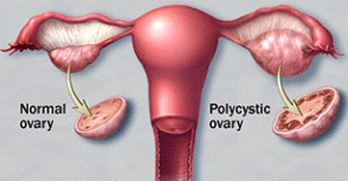PCOS and Infertility
The Polycystic ovarian syndrome also known as PCOS is a common cause of infertility nowadays. This condition has minute cysts in the ovary that causes ovulation disorder in women.
PCOS is a primary ovarian condition with multiple small cysts in the ovary and comprises high production of androgens. It is a familiar condition in women in their reproductive age.
This disorder can be found in normal women and full expression of this disease also called Stein-Leventhal syndrome is the rarest case. The cause of this condition is not fully known but it creates many problems like weight gain issues, hair growth on face and body, irregular periods, non-frequent ovulation to name a few.
It even leads to miscarriages and infertility. The problem is not only limited to fertility but such women also at high risk of developing womb cancer, heart diseases and even type 2 diabetes. Also, these ladies can easily develop gestational diabetes.
If a woman gets her period irregularly, chances are high that she has PCOS as 90 percent of women with irregular periods (oligomenorrhoea) have this disorder and 30 percent of women who don’t get even irregular periods (amenorrhoea) also suffer from this problem.
70 percent of women who experiences anovulation also have PCOS.
How PCOS gets diagnosed?
Laparoscopy: This technology allows direct inspection into the ovary but ovaries with poly cysts can appear normal in laparoscopy.
Vaginal ultrasound: This scan clearly shows the appearance of ovary cyst in the report.
Blood Hormonal level tests: Normally taken during first four days of the cycle, if there is no period then can be taken at any time and might be repeated if the report is not clear.
These tests are to show the levels of LH, FSH, androgens, and SHBG in the blood. In PCOS cases normally LH, androgens, and testosterone levels are increased and LH is normally low or normal.
Even blood report having normal levels of hormones cannot confirm a nonexistence of PCOS.
How to overcome PCOS?
Exercise and weight loss: This is the most natural way to restore menstruation and ovulation in PCOS patients. Also, the healthy lifestyle changes will help you in many other ways. Weight loss also reduces the risk of developing diabetes 2 in the future.
Ovulation induction with Clomid (clomiphene) tablets: This is a very effective treatment for PCOS with great success rate. In 70 percent women, it restores their menstruation and ovulation and in around 30 percent cases women conceive within 3 months of treatment.
These tablets are also given with steroids to reduce androgen production. This treatment is given for 6 months as a trial and if it does not work then controlled ovarian stimulation with FSH or hMG combined with hCG is used.
Surgery: It is the last option for treatment when medication does not work and the woman also experienced OHSS. It is an ovarian drilling surgery with high success rate. Between 70-90 percent of women gets regular ovulation after the surgery and after one year of surgery, 40-60 percent of women have the chance to conceive.
PCOS
Success Rate
Contact Us
Not​ only​ Dr​ Sarita​ is​ a proficient​ ivf​ doctor​ but​ she​ is​ warm,​ inviting​ and​ encouraging too.​ This​ is​ the​ factor​ that​ motivates​ patients​ to​ achieve​ their​ child​ dream​ despite different​ odds.
Being​ an​ infertility​ patient​ I believe​ result​ matter​ the​ most​ for​ any​ doctor​ and​ this​ is what​ Dr​ Sarita​ has​ done​ consistently.
The​ ivf​ doctor​ like​ Dr​ Sarita​ could​ only​ perform​ and​ extract​ miraculous​ result.​ While other​ infertility​ doctor​ gave​ me​ thumbs​ down,​ Dr​ Sarita​ treated​ us​ until​ I get pregnant.
If​ I am​ not​ treated​ by​ Dr​ Sarita,​ I could​ hardly​ think​ of​ becoming​ pregnant.​ It​ was​ her extraordinary​ effort​ that​ provide​ baby​ in​ my​ lap.
I​ am​ truly​ blessed​ that​ my​ infertility​ problem​ is​ satisfyingly​ treated​ by​ Dr​ Sarita.​ I am a​ blessed​ mother​ of​ a baby​ now​ which​ is​ only​ possible​ with​ her​ effort​ now.
As​ a patient,​ mostly​ we​ worried​ about​ the​ outcome​ of​ the​ treatment​ done​ by​ doctor. In​ this​ regard​ Dr​ Sarita​ is​ highly​ admirable​ as​ she​ truly​ works​ to​ get​ positive​ result and​ fulfils​ our​ baby​ dream.
Success​ or​ failure​ is​ of​ the​ treatment​ is​ largely​ depend​ on​ the​ quality​ of​ doctor.​ With sheer​ incense​ Dr​ Sarita​ turns​ things​ in​ patient’s​ favour.
Providing​ appropriate​ treatment​ is​ the​ primary​ objectives​ of​ Dr​ Sarita’s​ clinic.​ She​ is an​ expert​ infertility​ doctor​ who​ has​ an​ ability​ to​ explain​ our​ options​ as​ well​ as​ the statistical​ likelihood​ of​ success​ with​ various​ options.
Finding​ the​ right​ infertility​ doctor​ is​ a tough​ job.​ However​ Dr​ Sarita​ is​ the​ end-search of​ ivf​ doctor​ that​ provides​ miraculous​ result​ and​ take​ extreme​ care​ of​ patients.
I​ would​ like​ to​ “thank​ youâ€â€‹ Dr.​ Sarita​ from​ the​ bottom​ of​ my​ heart,​ thank​ you​ so​ much for​ all​ your​ care​ & concerns​ before​ and​ during​ the​ infertility​ treatment​ process &​ for the​ fantastic​ delivery​ of​ my​ healthy​ baby​ boy.



No Comments